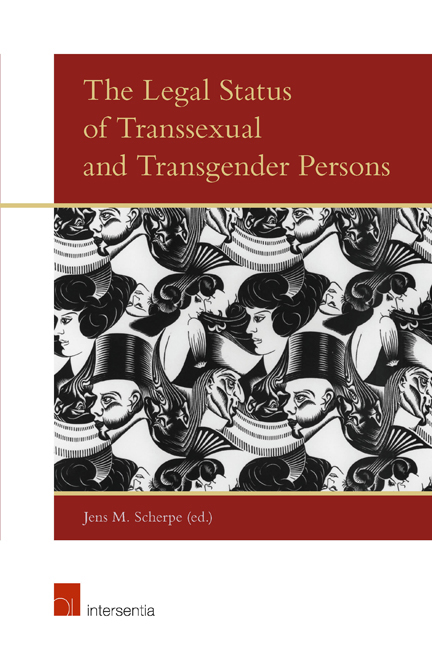Book contents
- Frontmatter
- Dedication
- Preface
- Contents
- List of Contributors
- Introduction
- PART I MEDICAL/PSYCHOLOGICAL VIEWS
- PART II CHRISTIAN VIEWS
- PART III LEGAL VIEWS
- Europe
- Belgium and the Netherlands
- Czech Republic
- Denmark
- England and Wales
- Germany
- Ireland
- Italy
- Spain
- Sweden
- Turkey
- Asia
- Australia and New Zealand
- North and South America
- PART IV CONCLUSION
Germany
from Europe
Published online by Cambridge University Press: 28 November 2017
- Frontmatter
- Dedication
- Preface
- Contents
- List of Contributors
- Introduction
- PART I MEDICAL/PSYCHOLOGICAL VIEWS
- PART II CHRISTIAN VIEWS
- PART III LEGAL VIEWS
- Europe
- Belgium and the Netherlands
- Czech Republic
- Denmark
- England and Wales
- Germany
- Ireland
- Italy
- Spain
- Sweden
- Turkey
- Asia
- Australia and New Zealand
- North and South America
- PART IV CONCLUSION
Summary
GENDER AND TRANSGENDERISM AS LEGAL CONCEPTS – THE FRAMEWORK
Under German law, the gender of human beings is relevant right from the beginning of their lives. Once a child is born, the civil status registrar is required by the Personenstandsgesetz (PStG), the German Civil Status Act, to certify in the birth register not only the child's name, place, day, hour and minute of birth and the parents’ names, but also the legal gender of the child (see § 21(1) No. 3 PStG). The gender to be registered – which can only be either female or male, although the wording of the Civil Status Act is actually silent on that point – is solely determined by the biological sex characteristics of the child and by the fact whether those characteristics conform to either the female or male legal gender. Any personal identification is irrelevant. Indeed, at such a young age, it would simply not be possible to ascertain such an identification.
Once documented by the registrar, the legal gender of a person is part of his or her civil status for life, mainly with consequences for family law where the legal gender of a person is still relevant. Just two examples: According to the Bürgerliche Gesetzbuch (BGB), the German Civil Code, the mother of a child can only be a woman who has given birth to the child, see § 1591 BGB (‘Mutter eines Kindes ist die Frau, die es geboren hat.’). Similarly, the father of a child can only be a man who meets the conditions for his legal fatherhood, see § 1592 BGB (‘Vater eines Kindes ist der Mann …’). Additionally, only a female and a male person can conclude a marriage, whereas only persons of the same legal gender can enter into a registered partnership under the Lebenspartnerschaftsgesetz (LPartG), the German Registered Partners Act, see § 1(1)1 LPartG.
Yet what happens if, after the birth of a child, the legal gender of the child cannot be determined because the child's body shows ambiguous sex characteristics? In the past, the parents, doctors and midwives had – often prematurely – to decide on the child's male or female legal gender.
- Type
- Chapter
- Information
- The Legal Status of Transsexual and Transgender Persons , pp. 207 - 222Publisher: IntersentiaPrint publication year: 2015

